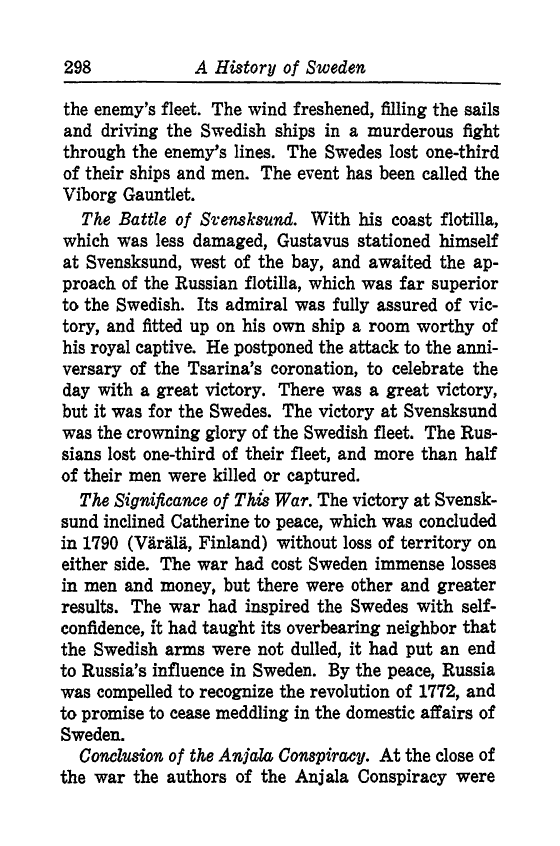
Full resolution (TIFF) - On this page / på denna sida - XVI. Reign of Gustavus III, 1771–1792 - H. The Russian War—Second Part, 1789–1790

<< prev. page << föreg. sida << >> nästa sida >> next page >>
Below is the raw OCR text
from the above scanned image.
Do you see an error? Proofread the page now!
Här nedan syns maskintolkade texten från faksimilbilden ovan.
Ser du något fel? Korrekturläs sidan nu!
This page has never been proofread. / Denna sida har aldrig korrekturlästs.
298 A History of Sweden
the enemy’s fleet. The wind freshened, filling the sails
and driving the Swedish ships in a murderous fight
through the enemy’s lines. The Swedes lost one-third
of their ships and men. The event has been called the
Viborg Gauntlet.
The Battle of Svensksund. With his coast flotilla,
which was less damaged, Gustavus stationed himself
at Svensksund, west of the bay, and awaited the ap-
proach of the Russian flotilla, which was far superior
to the Swedish. Its admiral was fully assured of vic-
tory, and fitted up on his own ship a room worthy of
his royal captive. He postponed the attack to the anni-
versary of the Tsarina’s coronation, to celebrate the
day with a great victory. There was a great victory,
but it was for the Swedes. The victory at Svensksund
was the crowning glory of the Swedish fleet. The Rus-
sians lost one-third of their fleet, and more than half
of their men were killed or captured.
The Significance of This War. The victory at Svensk-
sund inclined Catherine to peace, which was concluded
in 1790 (Varala, Finland) without loss of territory on
either side. The war had cost Sweden immense losses
in men and money, but there were other and greater
results. The war had inspired the Swedes with self-
confidence, it had taught its overbearing neighbor that
the Swedish arms were not dulled, it had put an end
to Russia’s influence in Sweden. By the peace, Russia
was compelled to recognize the revolution of 1772, and
to promise to cease meddling in the domestic affairs of
Sweden.
Conclusion of the Anjala Conspiracy. At the close of
the war the authors of the Anjala Conspiracy were
<< prev. page << föreg. sida << >> nästa sida >> next page >>